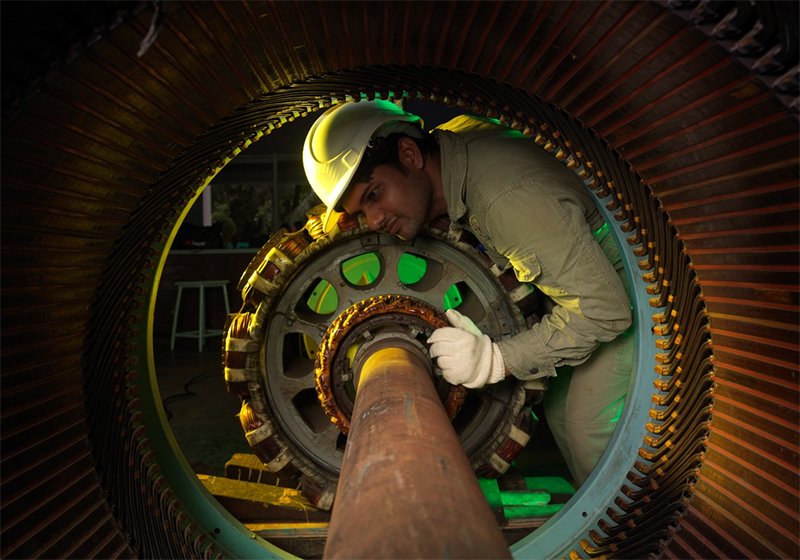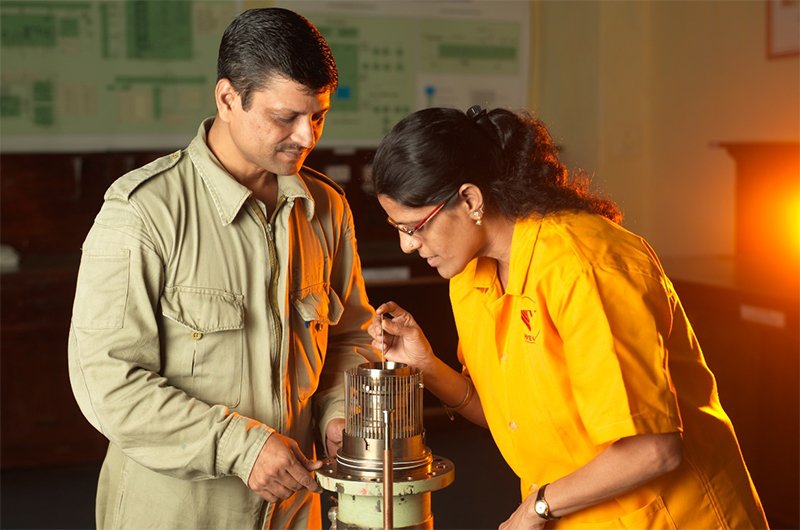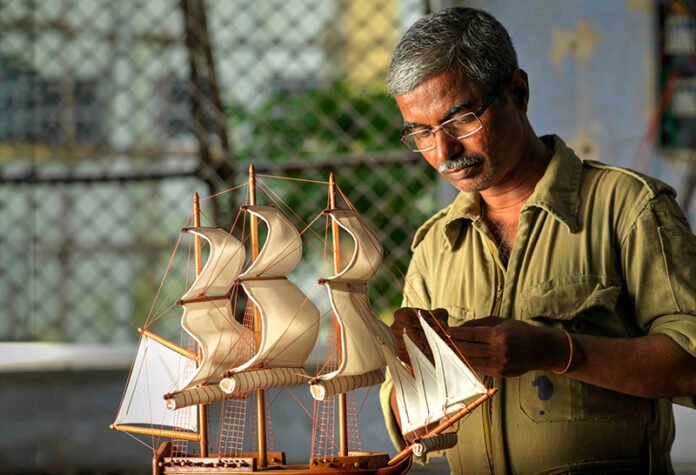“the best preparation for tomorrow is doing your best today”, is indeed a quote so very apt for the role played by the civilians serving as the personnel of the Indian Navy and keeping in mind the role that the civilians play in maintaining the wheels of the Indian Navy moving smoothly indeed makes it apt for 2024 to have been marked as “Year of the Naval Civilians.”
With civilians playing an important role in the Indian Navy, their well-being and satisfaction directly impact the Navy’s operational readiness.
Keeping in mind the role of the civilians as a link between the unit and external agencies on civilian matters, it is indeed in the fitness of things to make 2024 as the “Year of the Naval Civilians,” with focus on administrative efficiency, digital initiatives, training programmes and welfare activities.
The Indian Navy has a sanctioned civilian workforce of about 46,000, constituting about 35 percent of its strength, it includes a variety of occupations, such as aircraft mechanic, electrician, engineer, pipefitter, and physician. Each of these personnel working in the Navy are indeed important cogs in the smooth running of the Navy, who keep the flag flying high.
Navy civilians bring a broad spectrum of knowledge, skills and abilities to the nation’s Navy ranging from shipyard and aircraft maintainers to budget analysts to high-end scientists and engineers to communications specialists and so much more. Some of these people have clear developmental pathways.
Civilian personnel impact the overall performance of naval formations such as at command headquarters, dockyards, material organisations, naval armament depots, naval armament inspectorates, training establishments and several other types of support units.
With civilians playing an important role in the Indian Navy, their well-being and satisfaction directly impact the Navy’s operational readiness
Several initiatives have been conceived and implemented to enhance organisational efficiency and satisfaction levels amongst Navy’s civilian personnel and it is for this purpose that the government set up a Directorate of Civilian Personnel (DCP) which under Vice Admiral Sanjay Bhalla launched numerous schemes for the welfare of the civilian personnel.
However, it is imperative that impetus be provided to their administration, training, and welfare so that they effectively contribute towards ensuring that the Indian Navy always remains a combat ready, credible, cohesive, and future-proof force.

Nothing could be more apt than the saying “The Navy is not a job; it is not a career. It is a way of life.”
A far cry from duty ashore, challenges and responsibilities are the hallmark of life at sea. At sea, the Captain leads his team of officers and Agniveers. In the “good old days”, ships were propelled by sails harnessing the power of the winds. Work on ships involved extensive rope-work, swabbing decks, and polishing brass. But today’s ships have specialist sensor operators, guided missiles, homing torpedoes, complex machinery and state-of-the art communication networks to be taken care of.
Work on-board ships is divided amongst teams that do different kinds of jobs. They could be involved in the operation of various equipment such as radars, sonars, or communications, or firing of weapons such as missiles, guns, or rockets. Other diverse teams involve Chefs, Stewards, Medical Assistants, and others who are additionally trained to work with weapons. For each naval personnel, skills, knowledge, abilities, resolve, physical and mental toughness are put to test at sea. ‘Sea duty’ does not mean always being at sea. Each ship will have its own ‘home-port’ and personnel spend a fair amount of time in or close to the port. At sea, personnel visit far-flung places in India and abroad, which they may only have read or heard about. While at sea, the Navy looks after the welfare of the family like its own.
Modern ships, submarines and aircraft of the Indian Navy are highly sophisticated and technologically advanced platforms. Onboard ships, civilian personnel are involved in operating the state-of-the art weapons, navigational systems, communication sets, diving equipment, in addition to their maintenance. Personnel go through training in the art of seamanship, operating weapons and sensors, look-out duties, boat-work, and man-management. All personnel are also trained in Nuclear, Biological, Chemical Warfare and Damage Control including Fire Fighting.

The move to declare 2024 as the Year of the Naval Civilians was to improve administration, efficiency, and well-being of naval civilians by addressing all facets of civilian HR management in a time bound manner.
The foundation of the modern Indian Navy was laid in the 17th century when the East India Company had established a maritime force, thereby graduating in time to the establishment of the Royal Indian Navy in 1934 which was the predecessor of the present-day Indian Navy.
The Indian Navy is the key enabler and guarantor of the country’s maritime sovereignty and myriad use-of-the-sea activities. This is discharged by the Navy through its four roles – military, diplomatic, constabulary, and benign.
The objective of the Navy’s military role is deterrence or dissuasion against any intervention or act which is against national interests, and the ability to inflict a crushing defeat on the adversary in the event of hostilities.
A major objective of the Navy’s constabulary role is to ensure coastal and offshore security and implement anti-piracy measures in conjunction with the Coast Guard and other central and state agencies.
Navy civilians bring a broad spectrum of knowledge, skills and abilities to the nation’s Navy ranging from shipyard and aircraft maintainers to budget analysts to high-end scientists and engineers to communications specialists
The Chief of the Naval Staff (CNS) exercises operational and administrative control of the Indian Navy from the Integrated Headquarters of Ministry of Defence (Navy). He is assisted by the Vice Chief of the Naval Staff (VCNS) and three other Principal Staff Officers, namely the Deputy Chief of the Naval Staff (DCNS), the Chief of Personnel (COP) and the Chief of Material (COM).
The Navy has three Commands, each under the control of a Flag Officer Commanding-in-Chief:
1) The Western Naval Command (Headquarters at Mumbai).
2) The Eastern Naval Command (Headquarters at Visakhapatnam)
3) The Southern Naval Command (Headquarters at Kochi).
The Western and the Eastern Naval Commands are ‘Operational Commands’, and exercise control over operations in the Arabian Sea and the Bay of Bengal respectively. The Southern Command is the Training Command.
The Indian Navy has taken steps to improve the work environment for its civilian personnel. The Indian Navy reached an agreement with Bajaj Allianz Life Insurance Company to offer affordable term insurance to naval civilians.
The Indian Navy declared 2024 as ‘Year of Naval Civilians’ to improve administration, efficiency, and well-being of Naval Civilians by addressing all facets of Civilian HR Management in a time bound manner.
The major focus areas for boosting the Naval personnel’s morale were identified for implementation in the year 2024, and were focussed on administrative efficiency, digital initiatives, generic and specific training programmes, and welfare activities.

As part of the exercise to boost the working conditions of civilian personnel in the Navy, several initiatives were taken by the Directorate of Civilian Personnel (DCP) set up specially for this purpose and among them is the provision of 152 dependent family members of deceased personnel being appointed on compassionate grounds in Group C civilian posts under Employment Assistance scheme to provide immediate succour from financial distress.
The year 2024 saw numerous programmes for the civilians and this included one between DGMS(N) in collaboration with Directorate of Civilian Personnel and WellM health consultants.
A workshop on Mental Health Wellness of Defence Civilians of Indian Navy chaired by Surgeon Vice Admiral Arti Sarin, DGMS(N) and Dr Promila Batra, an eminent psychologist addressed the gathering and motivated the Civilian personnel to maintain positive Work-Life Balance & Physical fitness. Commodore Saurabh Agrawal, Cmde (CP)-II delivered the opening address. More than 300 Defence civilians benefited from the outreach Health event.
Modern ships, submarines and aircraft of the Indian Navy are highly sophisticated and technologically advanced platforms. Onboard ships, civilian personnel are involved in operating the state-of-the art weapons, navigational systems, communication sets, diving equipment, in addition to their maintenance
The year saw Rear Admiral Aditya Hara release the latest edition of the Handbook titled Administration of Naval civilian Personnel – A Guide to Effective Management. The handbook compiled by the Directorate of Civilian Personnel, Naval Headquarters, New Delhi, is a comprehensive guide which serves as a one-stop reference for service and civilian officers, covering recruitment, career planning, grievance redressal, pay & allowances, and staff welfare. The Admiral congratulated the editorial team for their hard work and dedication in bringing this invaluable resource to life.
As part of the boost to civilians in the Indian Navy, it saw a revamp of the Naval Civilian Management Information System, #NCMIS, its website, featuring integrated Chatbot ‘DCP Mitr’ and Disciplinary & Vigilance management Module, was launched by Vice Admiral Sanjay Bhalla, #COP at #Naval Headquarters. This project, entirely conceptualised, designed, and developed in-house, introduces 14 new user-friendly features for #Naval Civilian personnel, now consolidated on one platform for easy access. With such Digital initiatives, the Directorate of Civilian Personnel #DCP remains committed to enhancing support for its Civilian employees – our true Force Multipliers.
– The writer is a senior journalist and media consultant. The views expressed are of the writer and do not necessarily reflect the views of Raksha Anirveda.






